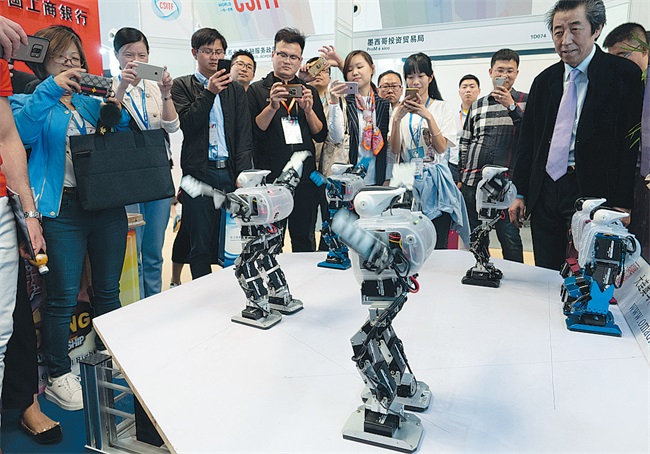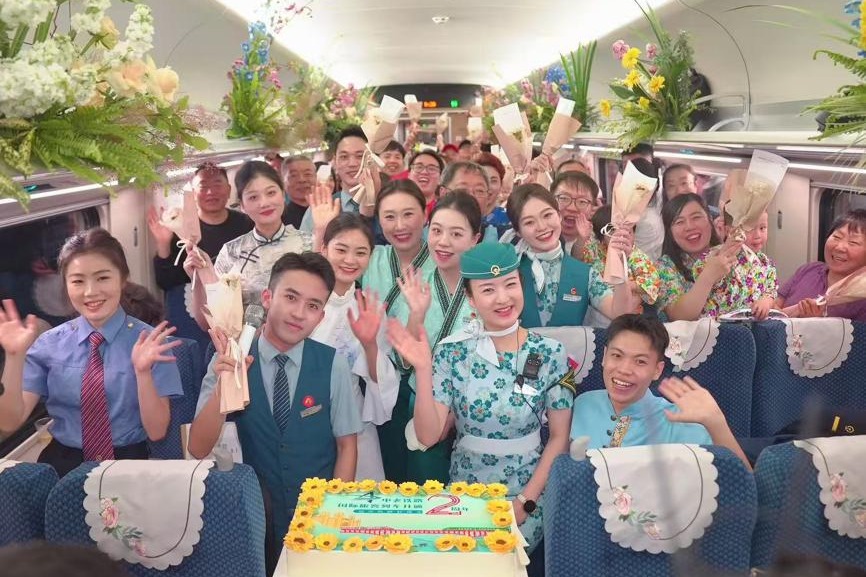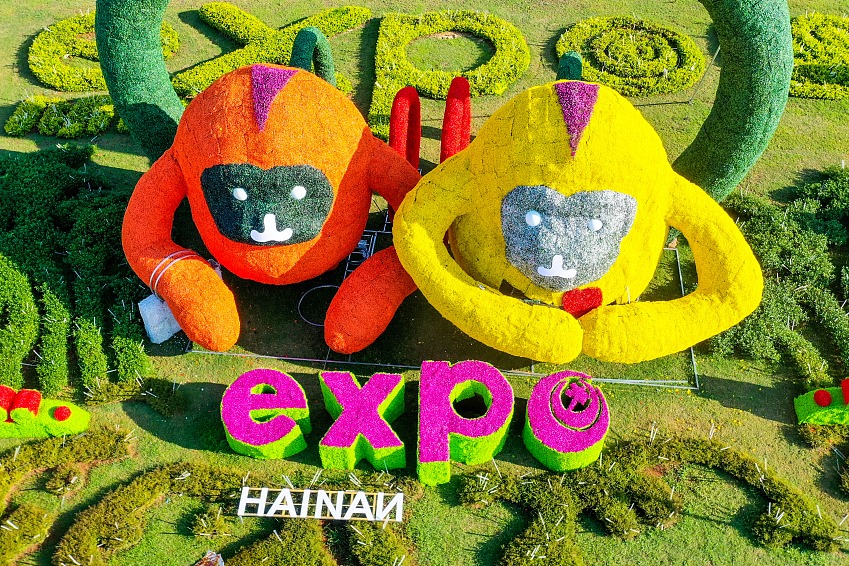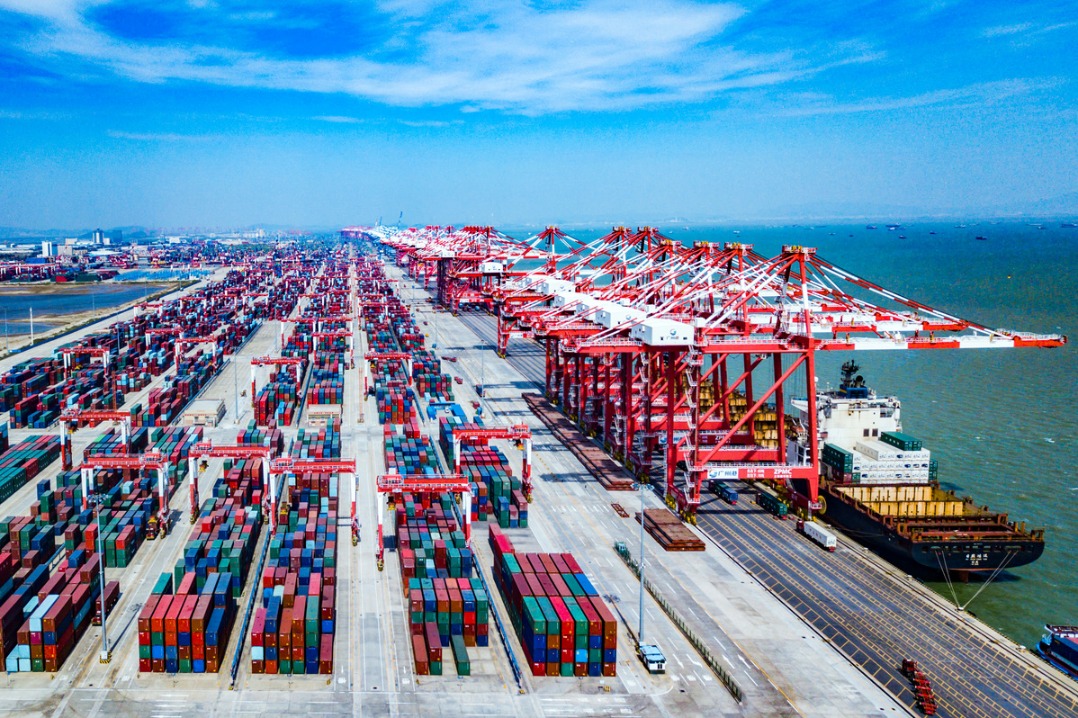Robots and AI take centerstage
By SHI JING in Shanghai | China Daily | Updated: 2018-04-28 01:53

A host of domestic and foreign companies unveil new innovations related to such technologies at this year’s CSITF
Artificial intelligence (AI) and robotics dominated the 6th China (Shanghai) International Technology Fair (CSITF) this year.
According to the exhibition organizer, a total of 47 companies and institutions unveiled 55 new projects during the fair, the majority of which were focused on the application of AI, big data, Internet of Things and robotics. Among these newly released projects, 23 percent came from overseas.
The three-day fair which started on April 19 attracted a total of 55,361 visitors, up 5 percent from last year. The majority 81 percent of them were professional audiences.
British robotics startup company Emotech released its latest robot Olly during the CSITF. Designed in the shape of a doughnut, Olly is said to be the first robot in the world with a personality that can be developed through interactions with the user. Olly can also predict and provide customized services to the user such as playing the user’s favorite music every day as a morning call.
Zhuang Hongbin, co-founder and CEO of Emotech, said that the first English version of Olly will be available in Europe and the United States in September for $699. The Chinese version is likely to be released at the end of this year or early 2019.
Shanghai Xiaoi Robot Technology Co Ltd also showcased the latest version of its Xiaoi robot during the fair. By integrating technologies related to semantic analysis, knowledge engineering, big data and AI, Xiaoi is able to recognize and execute various orders simultaneously given by different users.
Zhu Pinpin, founder and CEO of Xiaoi, said that the robot can be used in businesses that provide customized services, smart offices and medical facilities.
Meanwhile, Beijing-based Yunji Technology demonstrated during the fair how its robot can be widely used to show guests the way to their hotel rooms, deliver infusion bags in the hospital and send documents to different offices in a building.
Zhi Tao, co-founder and CEO of Yunji Technology, said that such service robots would eventually become commonplace in households as the technology advances and supply chain matures. He claimed that such robots could be rented to families for a fee that is cheaper than hiring a domestic helper.
“In the future, we would like to see such robots become employees rather than being simply a commodity,” he said.
Robots aside, Guangzhou-based Cloudwalk released its latest structured light product during the CSITF. Structured light is a technology that is used in the facial recognition function of the iPhone X. Cloudwalk’s product is the first of its kind in China as most smartphones made by domestic manufacturers rely on 2D facial recognition technology. Zhang Li, vice president of Cloudwalk, said that structured light technology enables the facial recognition function to respond more quickly and precisely.
Shanghai Rongkai Information Technology Co Ltd attended the CSITF in hope of seeking cooperation in the form of intellectual property rights trade. According to Wang Jiaqi, president of Rongkai, the AI they have developed is capable of investing in the stock market after analyzing financial transaction data. The AI has already been tested in eight banks around the world, resulting in substantial profit to investors, according to the company.
In a regular municipal government’s meeting at the end of 2017, Party Secretary of Shanghai Li Qiang initiated the concept of promoting the “four brands” of Shanghai — services, manufacturing, shopping and culture.
In a meeting on April 24, Li further explained that manufacturing development in Shanghai should be centered on core technologies, high-end industrial clusters and reliability. In addition, the city should foster greater integration between internet technologies and manufacturing.
Traditional manufacturing modes should also be renewed by adopting new technologies such as Internet of Things and AI, and the city will encourage local administrations and companies to come up with standards stricter than national ones so that “Made in Shanghai” will become known for high quality, said Li.
Contact the writer at shijing@chinadaily.com.cn
























